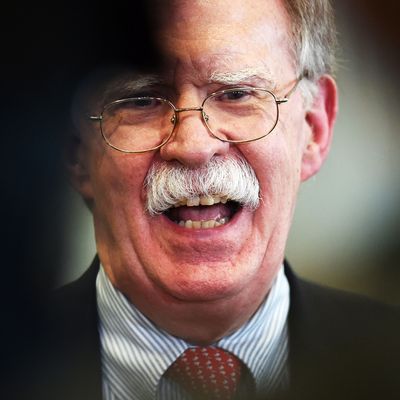
You have to wonder if he does this to his ex-wives, too. In the swirl of Washington crazy that followed Trump’s Twitter firing of John Bolton on Tuesday, NBC reported that Trump had been reaching out to Bolton’s predecessor H.R. McMaster, to complain about Bolton and ask for advice on national security matters, including whom to appoint as secretary of defense.
No one is speculating about McMaster coming back, though — after all, Trump found him intensely annoying in person. Apparently this had also become true of Bolton, so much so that earlier this summer senior White House officials advised Bolton to avoid the president and plan as much foreign travel as possible to stay out of Trump’s way. Two months ago, Tom Wright pointed out that Bolton was literally sent to Mongolia while Trump and his entourage met with Kim Jong-un. Bolton was cut out of discussions about lowering preconditions for an agreement with North Korea, and not for the last time; Bolton also seems not to have been involved in planning for the president’s abortive Camp David Afghanistan summit last week or in the president’s decision to call off airstrikes on Iran back in June.
Remember, Bolton was once credited with being a bureaucratic ninja, a brilliant master of cabinet-level knife fights and death by memo. His anti-interventionist opponents feared that he would effectively mobilize the full force of the U.S. security apparatus in support of his warmongering policies, marginalizing and neutering President Trump in the process.
That sounds pretty silly now, doesn’t it?
Large swathes of left and libertarian right Washington are celebrating Bolton’s downfall. Not to be a killjoy, but there’s not much worth celebrating here. Bolton’s effort to get his way, and Trump’s desire to avoid dealing with him, mean that the ultimate bureaucratic warrior dragged the bureaucracy down with him. Bolton, who famously said you could lop ten floors off U.N. headquarters and no one would notice, went down with the floors of the National Security Council’s 19th-century headquarters caving in around him.
The United States — with the largest military and intelligence establishments the world has ever seen, diplomats abroad in 290-some missions and troops in more than 150 countries, embroiled in a trade war with its main peer competitor and many of its own allies — currently has no effective mechanism to coordinate its actions. Let that sink in. Trump plans a summit without the professional summit planners. White House staff go around the civilian chain of command at the Defense Department. Advisers without job titles or security clearances seem to write policies that State and Defense employees find out about via Twitter — in fact, senior employees at those and other agencies now spend important parts of their day watching the president’s Twitter account in case something relevant comes across.
Bolton accelerated this trend, including his own reported propensity to go around Defense Department officials whose views he did not share. Secretary of State Pompeo thrives on it, so much so that he’s being described as a possible successor to Bolton while staying in his current job. He’ll love the comparison to Henry Kissinger, who held both roles between 1973 and 1975; he might not love the other comparison, that the dual appointment came about in the midst of Watergate turmoil and the final decline of the Nixon White House.
But Kissinger had a staff that he had assembled and trusted, a reliable process for decision-making, and plenty of members of Congress, including Republicans, who took seriously the responsibility of oversight, even when the malfeasance came from one of their own.
The next national security adviser won’t have any of those things. Bolton has helped break the system in ways that will take a new president years to repair — ways that make an accidental war, or the launch of a missile, or deaths of Americans, or economic catastrophe more likely even under a less warlike figure. That’s nothing to celebrate.
And now Bolton himself is just another prominent national-security conservative whom Trump has used, discredited, and discarded. It would be a blessing if his allies in the GOP finally saw this as one humiliation too many. But that seems unlikely. Trump believes that “when you’re famous, they let you do it” — and, while women have sought to prove him wrong, too much of the GOP seems bent on proving him right.





























